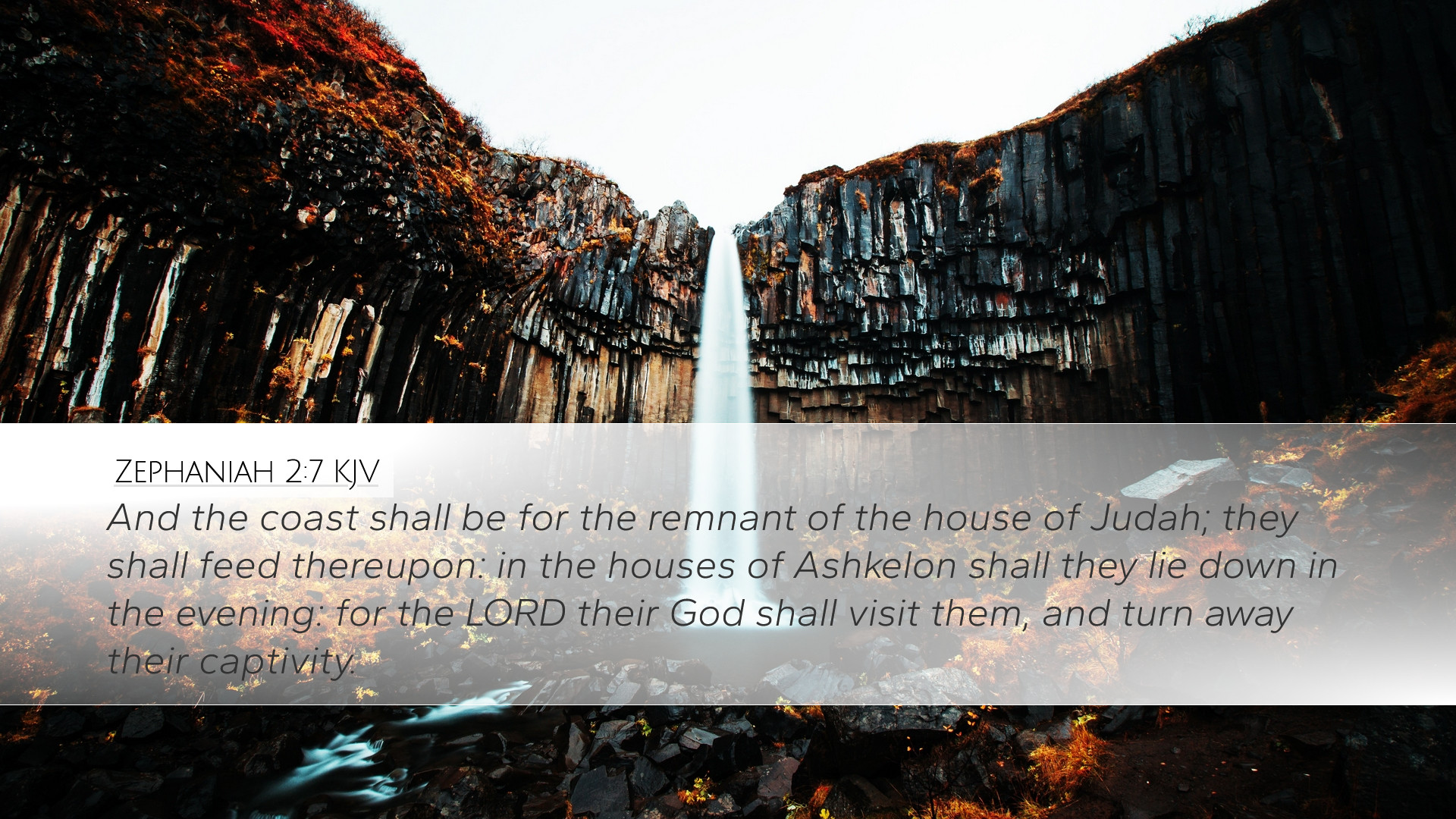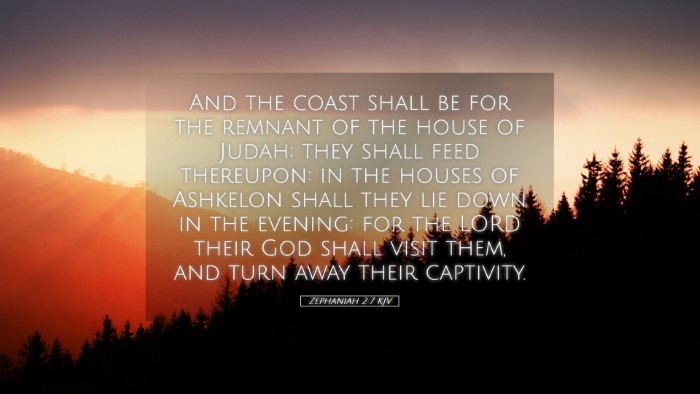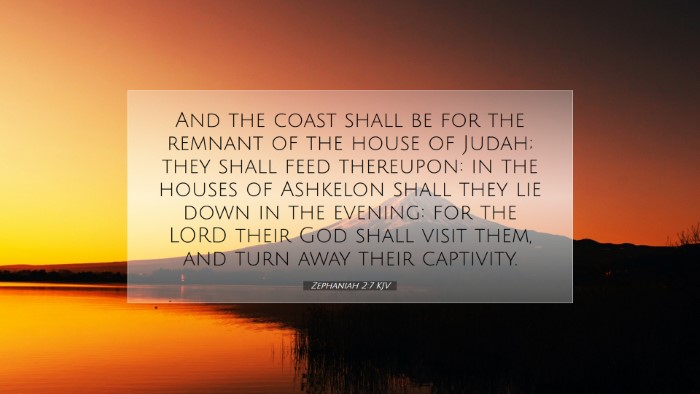Old Testament
Genesis Exodus Leviticus Numbers Deuteronomy Joshua Judges Ruth 1 Samuel 2 Samuel 1 Kings 2 Kings 1 Chronicles 2 Chronicles Ezra Nehemiah Esther Job Psalms Proverbs Ecclesiastes Song of Solomon Isaiah Jeremiah Lamentations Ezekiel Daniel Hosea Joel Amos Obadiah Jonah Micah Nahum Habakkuk Zephaniah Haggai Zechariah MalachiZephaniah 2:7
Zephaniah 2:7 KJV
And the coast shall be for the remnant of the house of Judah; they shall feed thereupon: in the houses of Ashkelon shall they lie down in the evening: for the LORD their God shall visit them, and turn away their captivity.
Zephaniah 2:7 Bible Commentary
Commentary on Zephaniah 2:7
Text of Zephaniah 2:7 (ESV): "The seacoast shall become the possession of the remnant of the house of Judah, on which they shall graze, and in the houses of Ashkelon they shall lie down at evening. For the Lord their God will be mindful of them and restore their fortunes."
Introduction
Zephaniah, a prophet of the Lord, delivers a message during a period of impending judgment but also assures hope and restoration for the people of God. In particular, Zephaniah 2:7 encapsulates the changing fortunes of Judah, emphasizing God’s attentive care for His people and their eventual restoration and blessings even amidst adversity. This commentary synthesizes insights from notable public domain theologians such as Matthew Henry, Albert Barnes, and Adam Clarke.
Contextual Background
The Book of Zephaniah addresses the coming Day of the Lord, warning both Judah and the nations of the judgment that awaits them due to their idolatry and moral corruption. However, amid these dire predictions, Zephaniah also conveys the promise of restoration for the faithful remnant. The name Zephaniah means “the Lord has hidden,” which reflects the theme that while judgment is pronounced, there remains a select group that God has preserved.
Exegesis of Zephaniah 2:7
-
“The seacoast shall become the possession”
Henry remarks that the seacoast, particularly the region of the Philistines including Ashkelon, is significant because it represents areas previously associated with Israel's enemies. The term “possession” here indicates a divine reversal of fortunes, implying that the promises of land and sustenance are being restored to God's chosen people.
-
“of the remnant of the house of Judah”
Barnes emphasizes the importance of the remnant—a consistent Biblical theme whereby despite widespread judgment, God preserves a faithful remnant. This remnant inherits the promises originally given to Israel, which showcases God’s faithfulness and commitment to His covenant people.
-
“on which they shall graze”
Clarke explains this phrase as indicative of peace and provision. The pastoral imagery signifies sufficiency, where the remnant will not only survive but thrive, reflecting a state of divine favor and blessing.
-
“and in the houses of Ashkelon they shall lie down at evening”
This metaphor of lying down symbolizes safety and rest, two fundamental aspects of God’s provision. Henry points out the ironic shift where those who were once oppressed by the Philistines will now dwell in their houses. This demonstrates God’s sovereignty over nations and His ability to redefine allegiances and fortunes.
-
“For the Lord their God will be mindful of them”
Barnes elucidates that being “mindful” here signifies active concern and remembrance. It illustrates that God does not forget His people, even during times of judgment. This should inspire confidence in the faithful that God's attention is steadfast, ensuring their ultimate restoration.
-
“and restore their fortunes”
Henry highlights the significance of restoration as a theme throughout the scriptures, representing not merely a return to former status but a transformative enhancement of their circumstances. This forward-looking promise projects hope for the future, assuring them of God’s redeeming love and grace.
Theological Implications
This verse communicates profound theological truths relevant for pastors and theologians today:
-
Hope Amid Judgment:
Even in the face of divine judgment, God provides hope. This teaches the importance of conveying messages of hope to congregations, emphasizing that God’s plans include future restoration.
-
God's Sovereignty:
The passage affirms God's control over nations and history. Reflecting on this encourages leaders to trust in God's overarching plan despite present appearances.
-
The Concept of Remnant:
Understanding the “remnant” reinforces the notion that God values fidelity to His covenant. This is a call to the church to remain faithful, knowing that the true church will always find refuge in God.
Practical Applications
In light of Zephaniah 2:7, several practical applications emerge:
-
Encouragement to the Faithful:
Pastors can use this verse to encourage those who feel marginalized or forgotten, reminding them that God has plans for restoration and blessing.
-
Affirming God’s Provision:
Highlighting God’s provision can help congregants see his active work in their lives, fostering a trust in God’s timing and goodness.
-
Community Building:
This message invites believers to come together as a community of faith, advocating for each other and lifting each other in times of trial, much like the remnant preserved by God.
Conclusion
Zephaniah 2:7 serves as a powerful reminder of God's steadfastness and care for His people, promising restoration and hope even amid judgment. By studying the insights from various commentaries, we recognize the depth of God's promises and His ultimate plans for His faithful remnant. This verse calls not only for reflection on God's past faithfulness but encourages believers to look forward to what God is accomplishing in their lives and communities.


